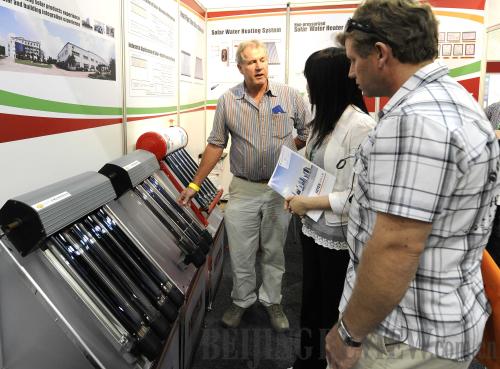|
 |
|
CLEAN ENERGY COOPERATION: Visitors check out Chinese solar panels on display at a new energy exhibition in South Africa's Johannesburg on March 1 (LI QIHUA) |
The second one is China's enhanced political and economic position. Its GDP exceeded Japan's in 2010, making China the world's second largest economy. China is playing a more important role in global political and economic affairs. It is gaining a bigger say in various international organizations and initiatives, both long-standing and newly established ones.
Shared interests
China and India are in Asia; Russia spans Europe and Asia; Brazil is in South America; and South Africa is in Africa. The attraction of BRICS is not their locations, spread out over much of the globe, but their common goal of improving economic cooperation.
With South Africa attending the upcoming summit in Sanya, BRIC will formally become BRICS. Covering a larger geographic area, the group will play a more representative and influential role on the world stage. Now, BRICS is not only a concept but an active international presence that emphasizes economic growth rather than military clout. Vigorously developing emerging markets will improve BRICS countries' economic strength and potential.
The participation of South Africa means the BRICS group is more geographically representative—it's now more globally influential, embodying its ideal of democratization of global governance and multi-polarization. Some critics say South Africa is not qualified to be a member due to its weaker economic strength. However, its participation is of great geopolitical significance to both the other four nations and South Africa itself.
South Africa has developed rapidly in recent years. It is the biggest economy in Africa with numerous ports and ample mineral resources. The country is also considered as an example of Africa's economic development. Through cooperation with South Africa, China, Russia, Brazil and India will be able to trade with and invest on the African continent more efficiently.
South Africa's entry will also assist with the organization's development and improve its international cooperation. Now, with members from Asia, Europe, Americas and Africa, BRICS has truly become a global economic club.
While boosting its global profile, BRICS should explore new concepts for development. Inclusiveness, cooperation, dialogue and win-win results should be shared concepts of BRICS members.
While facing common problems in development, the five members have great cultural and political differences. This requires the countries to respect each other's cultural traditions and political systems and focus on economic cooperation. In this way, they can also make greater contributions to building a new international economic order.
The author is a research fellow with the Chinese Academy of Social Sciences
BRICS Nations
|
Country |
Area (million square km) |
Capital |
Population |
Trade volume ($) |
GDP ($) |
|
Brazil |
8.515 |
Brasilia |
191 million |
383.5 billion (2010) |
2.02 trillion (2010) |
|
Russia |
17.075 |
Moscow |
141.9 million |
469 billion (2009) |
1.3 trillion (2009) |
|
India |
2.98 |
New Delhi |
1.21 billion |
458.23 billion
(Apr 2010-Jan 2011) |
1.007 trillion(2010-11 fiscal year) |
|
China |
9.6 |
Beijing |
1.34 billion |
2.97 trillion (2010) |
6.04 trillion (2010) |
|
South Africa |
1.219 |
Pretoria |
49.32 million |
127.25 billion (2009) |
313.3 billion (2009) |
(Source: China's Ministry of Foreign Affairs and National Bureau of Statistics) | 